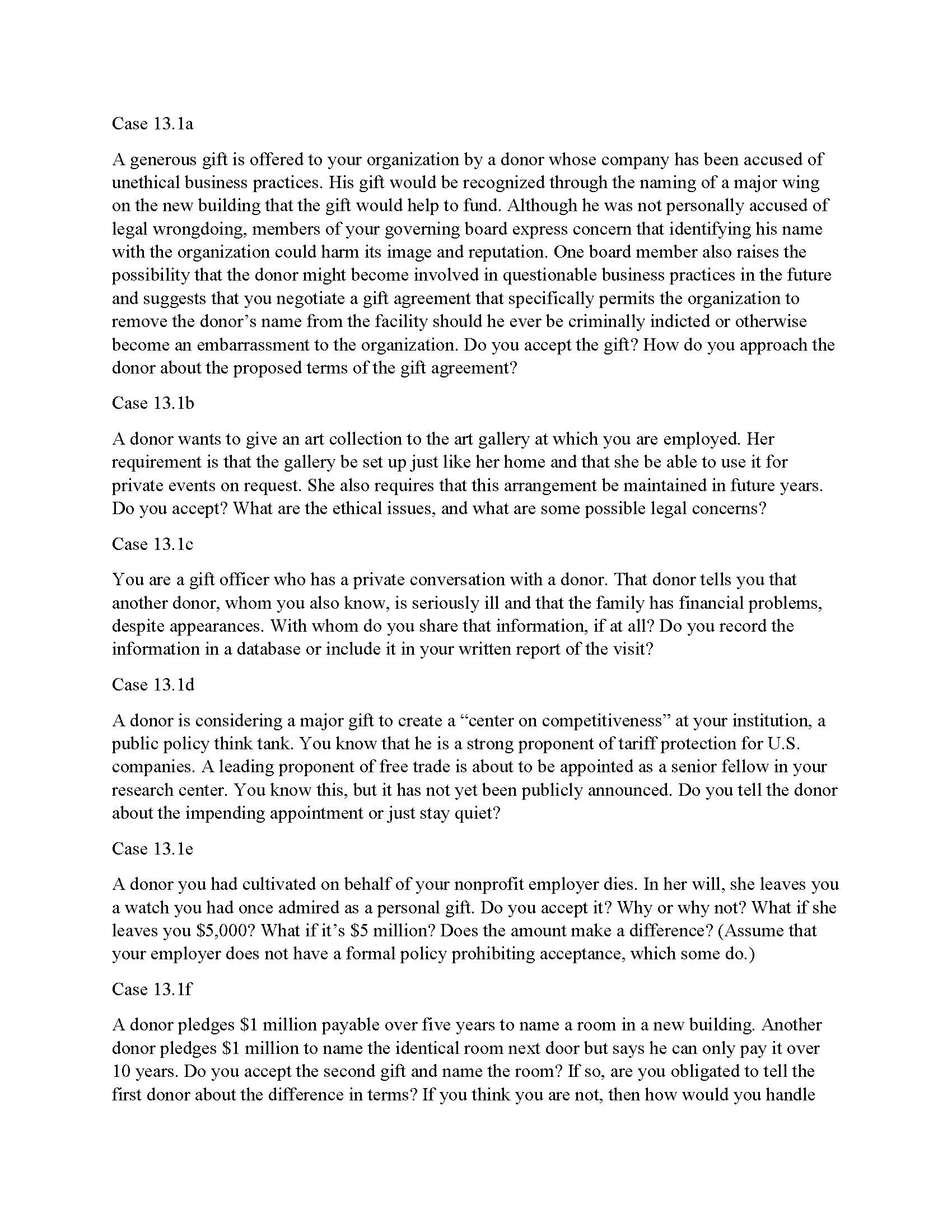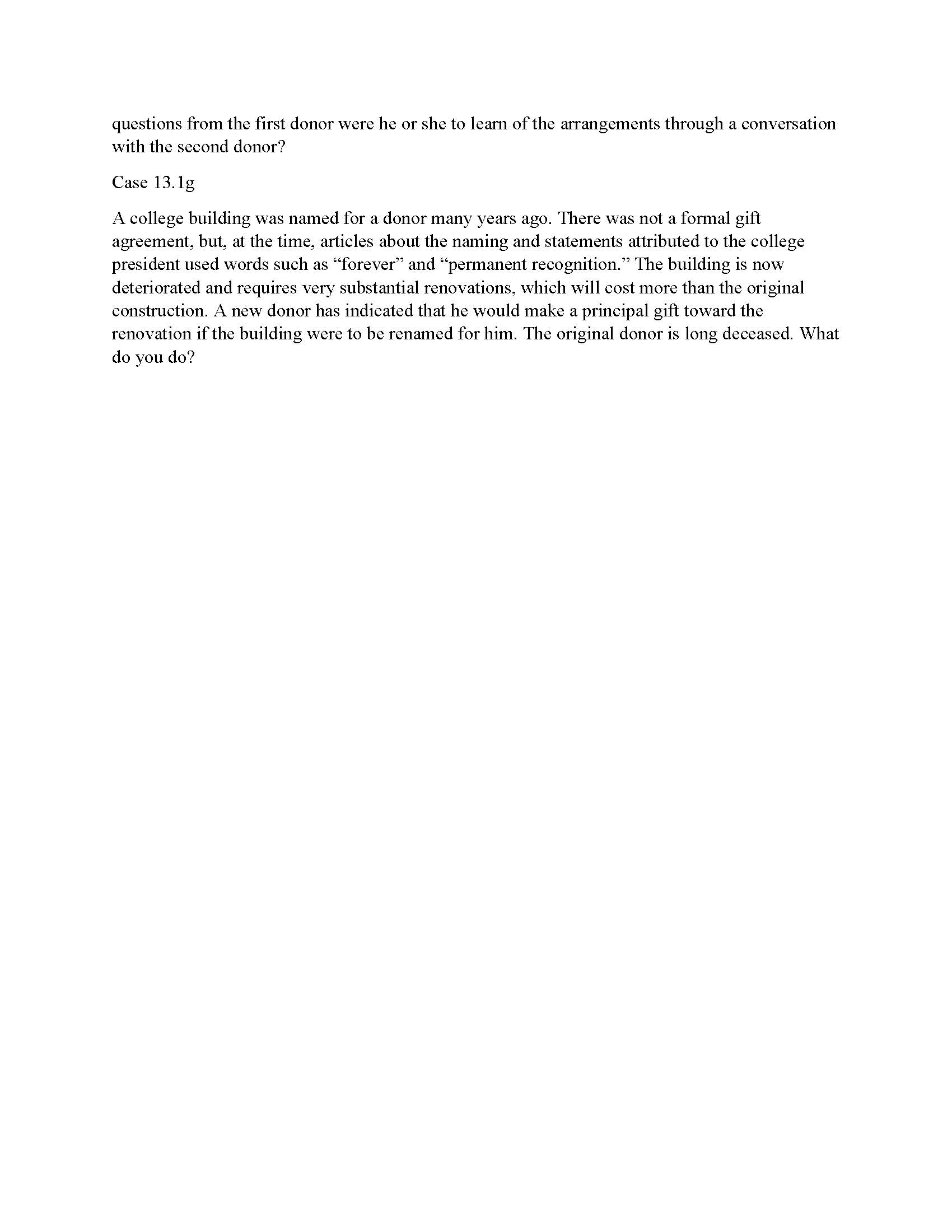Question
In cases 13.1 a-g , do the ethical issues involve behavior of a fund-raiser, conditions placed on the gift, the impact of the gift on
In cases 13.1 a-g , do the ethical issues involve behavior of a fund-raiser, conditions placed on the gift, the impact of the gift on the organization's mission and resources, characteristics or personal reputation of the donor, or concerns about privacy?
How would you have handled the issues raised by each case?
AND
Some people argue that donors should receive a more generous tax deduction for gifts to organizations that serve the poor, such as homeless shelters, than they receive for gifts to institutions that primarily serve the affluent, such as a symphony orchestra. Do you agree or disagree? Why?


Case 13.1a A generous gift is offered to your organization by a donor whose company has been accused of unethical business practices. His gift would be recognized through the naming of a major wing on the new building that the gift would help to fund. Although he was not personally accused of legal wrongdoing, members of your governing board express concern that identifying his name with the organization could harm its image and reputation. One board member also raises the possibility that the donor might become involved in questionable business practices in the future and suggests that you negotiate a gift agreement that specifically permits the organization to remove the donor's name from the facility should he ever be criminally indicted or otherwise become an embarrassment to the organization. Do you accept the gift? How do you approach the donor about the proposed terms of the gift agreement? Case 13.1b A donor wants to give an art collection to the art gallery at which you are employed. Her requirement is that the gallery be set up just like her home and that she be able to use it for private events on request. She also requires that this arrangement be maintained in future years. Do you accept? What are the ethical issues, and what are some possible legal concerns? Case 13.1c You are a gift officer who has a private conversation with a donor. That donor tells you that another donor, whom you also know, is seriously ill and that the family has financial problems, despite appearances. With whom do you share that information, if at all? Do you record the information in a database or include it in your written report of the visit? Case 13.1d A donor is considering a major gift to create a "center on competitiveness" at your institution, a public policy think tank. You know that he is a strong proponent of tariff protection for U.S. companies. A leading proponent of free trade is about to be appointed as a senior fellow in your research center. You know this, but it has not yet been publicly announced. Do you tell the donor about the impending appointment or just stay quiet? Case 13.1e A donor you had cultivated on behalf of your nonprofit employer dies. In her will, she leaves you a watch you had once admired as a personal gift. Do you accept it? Why or why not? What if she leaves you $5,000? What if it's $5 million? Does the amount make a difference? (Assume that your employer does not have a formal policy prohibiting acceptance, which some do.) Case 13.1f A donor pledges $1 million payable over five years to name a room in a new building. Another donor pledges $1 million to name the identical room next door but says he can only pay it over 10 years. Do you accept the second gift and name the room? If so, are you obligated to tell the first donor about the difference in terms? If you think you are not, then how would you handle
Step by Step Solution
There are 3 Steps involved in it
Step: 1

Get Instant Access to Expert-Tailored Solutions
See step-by-step solutions with expert insights and AI powered tools for academic success
Step: 2

Step: 3

Ace Your Homework with AI
Get the answers you need in no time with our AI-driven, step-by-step assistance
Get Started


